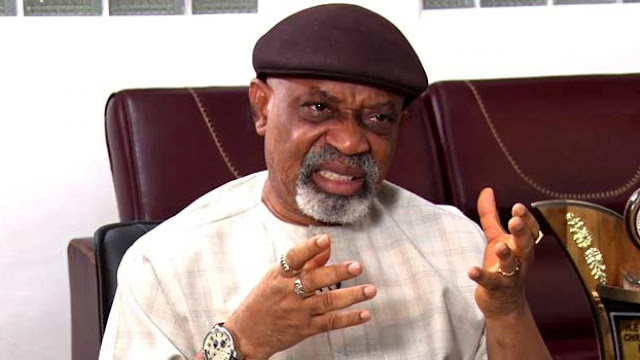By Williams Anuku Hopes of undergraduates returning to the classroom anytime soon have again been dashed as the Academic Staff Union...
By Williams Anuku
Hopes of undergraduates returning to the classroom anytime
soon have again been dashed as the Academic Staff Union of Universities (ASUU)
has ruled out any possibility of suspending its six months old strike.
Addressing journalists in Abuja on Tuesday, ASUU President,
Professor Emmanuel Osodeke, accused the Ministry of Labour and Employment,
chaired by Chris Ngige as “Conciliator” for continuously creating more chaos in
the resolution process.
ASUU had on February 14 embarked on a strike to press home
its demand, including the government’s investment in the nation’s university
infrastructure, and payment of members’ salaries through the recommended
University Transparency and Accountability Solution (UTAS), among several
others.
At the end of the 30 days, the federal government failed to
arrest the situation, which gave ASUU the impetus to roll-over the strike on
March 14. More recently, the union declared another 12 weeks’ strike, thereby
keeping the students perpetually at home.
Osodeke said the union will never suspend strike but ensure
it puts a permanent end to it.
“ASUU therefore makes bold to say that the Minister of
Labour and Employment has taken upon himself the role of unabashed protagonist
in our ongoing dispute with the government of Nigeria for some inexplicable
reasons.
“Dr Ngige earlier told whoever cared to listen that he was
not the employer of university academics and advised the union to march to the
Ministry of Education. Nigerians may wish to know why he has suddenly turned
around to constitute himself as an impediment to an amicable resolution of the
ongoing crisis.”
The union said it remains focused on its goal of making the
Nigerian University system internationally competitive and getting its products
to stand shoulder-to-shoulder with their peers in any part of the world.
“We appreciate the teeming Nigerians for identifying with
our vision in this respect. We specifically acknowledge the support and
sacrifices of our students (including our members who are running their
postgraduate programmes) as well as their parents; they are our critical
partners in this transformation project. We in ASUU shall do our utmost best
not to let you down.
“ASUU appreciates your concerns and sympathetic support. We
are as bothered as you are because we share a common interest in the Nigeria
project. However, ASUU shall continue to be guided by the sacred canons of
integrity, objectivity, and responsibility to which both academics and media
practitioners subscribe.
“It is our fervent hope and desire that the current
groundswell of interests would culminate in a convergence of solutions to this
avoidable crisis in the overall interest of Nigeria Together, we shall win. The
struggle continues,” he said.
Speaking further, Osodeke said if Ngige means well as a
“conciliator, he won’t be putting roadblocks on the path to completing a
process that has dragged on for more than five years.
“The Ministry of Labour and Employment, as the chief labour
ministry of the country, is principally expected to apprehend disputes between
employers and employees with a view to settling such disputes.
“The Ministry shall normally await reports of disputes by
either side to the disputes for settlement. When the Minister apprehends a
dispute, he/she must communicate to the parties or their representatives his or
her own proposal for the resolution of the dispute.
“However, ASUU has always had serious reservations about the
claim of “conciliation” by someone who has taken sides in the dispute, or by an
unabashed protagonist in the crisis such as the current Minister of Labour and
Employment. It is antithetical to the International Labour Organisation (ILO)
Conventions (98, 151 & 154) on collective bargaining.
“It is against the principle of natural justice and the
doctrine of equality for Dr. Ngige who carries himself as if he has personal
scores to settle with ASUU and shoots down the Union everywhere it matters to
assume the role of conciliator,” he added.
On the issue of funding of public universities, he said it
has become the pastime of government officials to talk tough about billions and
trillions of naira whenever the thorny issues of education and health sectors’
funding come up for mention.
However, he lamented that various sums of money in the same
region which could have been deployed for human capacity development and public
good usually develop into the thin air at the end of the day!
“We are therefore, not surprised the leadership of the
Ministry of Labour and Employment could condescend to the point of denigrating
the import of massive injection of fund into the University Education sub-sector
as they tried to miserably dismiss the vexed issue of funding Nigerian public
universities and uplifting the country’s intellectual capital. While the
government and its agents, would like to look at the issue in the “here and now
and funding as a one-off matter, we prefer to look at it longitudinally.
“ASUU believes that the idea of availability of funds is a
dynamic process. For instance, the government can mobilize funds from different
sources including non budgetary outlets like stamp-duty, GSM and alcoholic
taxes.
“We are appalled by the recent calls by top government
functionaries at both federal and state levels to establish more universities
at a time agencies run by same chief executives are tightly squeezed for
funding.”
“We restate our opposition to the proliferation of
universities and other tertiary institutions merely for political gains or
electoral value. Nigerians should read through the intentions of hypocritic
political jobbers when dangling the carrots of sitting institutions they have
no intention of developing to compete with others in Africa and beyond.”
Reacting to the acclaimed breakaway faction of ASUU,
Congress of University Academics (CONUA), Osodeke said the union doesn’t
recognize any official faction.














No comments